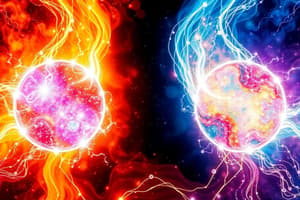Podcast
Questions and Answers
What is an oxidation state?
What is an oxidation state?
- The process where an atom loses protons
- A measure of how many electrons an atom has gained in a compound
- The process where an atom gains neutrons
- A measure of the relative degree of oxidation or reduction of an atom in a compound (correct)
In a redox reaction, which reactant gets reduced?
In a redox reaction, which reactant gets reduced?
- Both reactants get reduced
- None of the reactants get reduced
- The reactant that gains electrons (correct)
- The reactant that loses electrons
What is the oxidation state of hydrogen in water (H2O)?
What is the oxidation state of hydrogen in water (H2O)?
- -2
- +1
- -1 (correct)
- +2
Which term describes the transfer of electrons from one reactant to another in a chemical reaction?
Which term describes the transfer of electrons from one reactant to another in a chemical reaction?
How does an atom in a compound achieve an oxidation state of +1?
How does an atom in a compound achieve an oxidation state of +1?
What does the standard electrode potential measure in redox reactions?
What does the standard electrode potential measure in redox reactions?
In a redox reaction, what must be equal for the reaction to be balanced?
In a redox reaction, what must be equal for the reaction to be balanced?
What is denoted by the symbol 'M' in the given half-reaction: $M^n+
ightarrow M^{n+1} + e^-$?
What is denoted by the symbol 'M' in the given half-reaction: $M^n+ ightarrow M^{n+1} + e^-$?
If the standard electrode potential for a reaction is highly positive, what does it indicate?
If the standard electrode potential for a reaction is highly positive, what does it indicate?
Why are changes in oxidation states important in redox reactions?
Why are changes in oxidation states important in redox reactions?
Flashcards are hidden until you start studying
Study Notes
Oxidation and Reduction
Oxidation and reduction, often abbreviated as redox, are fundamental concepts in chemistry that describe the transfer of electrons between atoms, ions, or molecules during a chemical reaction. These processes form the basis of many important chemical transformations, including those involved in energy production and environmental processes.
Oxidation States
Before delving into redox reactions, it's essential to understand oxidation states. An oxidation state is a measure of the relative degree of oxidation or reduction of an atom in a compound compared to its elemental state. It can be expressed as positive, negative, or zero depending on whether an atom has gained, lost, or shared electrons with other atoms in the compound.
For example, in water (H2O), hydrogen has an oxidation state of -1 because each hydrogen shares two electrons with oxygen, which leaves one electron less than in its atomic state, while oxygen has an oxidation state of -2 due to sharing four electrons in total. This concept allows us to determine if a substance undergoes oxidation or reduction.
Redox Reactions
A redox reaction involves the transfer of electrons from one reactant to another. One of the reactants gets reduced and gains electrons, while the other gets oxidized and loses electrons. This exchange of electrons happens during the formation of bonds, leading to the balance of charges within a molecule or ion.
Redox reactions can be written in terms of half-reactions, where oxidation occurs in one half and reduction in the other. For instance, consider the following half-reactions:
[M^n+ \rightarrow M^{n+1} + e^- ]
In this half-reaction, (M) represents the original species, (M^{n+}) is the initial oxidation state, and (e^-) denotes an electron being transferred from the oxidizing agent to (M).
To balance a redox reaction, the number of moles of electrons produced by oxidation must equal the number of moles of electrons consumed by reduction. In general, redox reactions involve changes in the oxidation states of elements participating in these reactions.
Standard Electrode Potential
The standard electrode potential is used to predict the spontaneity of redox reactions. It measures the tendency of a substance to gain or lose electrons until a stable equilibrium is reached. If the standard electrode potential for a reaction is more negative than the standards for all reverse reactions, the forward reaction will occur without any external influence. A positive value indicates a nonspontaneous reaction that requires an external source of energy.
Understanding redox reactions and their implications across various fields is crucial for chemists, biologists, physicists, and engineers who work with materials, energy conversion, environmental science, and medicine.
Studying That Suits You
Use AI to generate personalized quizzes and flashcards to suit your learning preferences.




